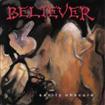 BELIEVER Sanity Obscure CD (Metal Mind) 15.98
BELIEVER Sanity Obscure CD (Metal Mind) 15.98I've never been a fan of "Christian" metal, especially within the more extreme realms of the underground, and because of this, I never really gave early 90s thrashers Believer a chance up until recently. It wasn't until I read about them in Jeff Wagner's book Mean Deviation that I became interested in checking them out. Wagner's description of the band's music, their technical offbeat thrash, and the more cerebral approach to matters of faith and theology made me curious to investigate further, leading me to a pair of reissues that came out on the Polish label Metal Mind Productions. Formed in Pennsylvania in the mid 80s, Believer started off as a relatively straightforward thrash act, but by the time of their second album Sanity Obscure, they had evolved into a complex, adventurous fusion of thrash, prog, and neo-classical influences. The band's Christian perspective was what most people knew them for, a novelty within the burgeoning extreme metal scene at that time, but even this aspect of their music stood apart from other bands with a similar background with a more intellectual investigation of "white" religion and Christ-based theology than, say, the cheesy glam of Stryper or the terminally lame Barren Cross.
Album number two from Believer, Sanity Obscure was a sudden leap forward from the pure thrash of their debut. The ripping thrash metal, powerful strained singing of front man/guitarist Kurt Bachman and stellar melodic leads are focused into an ambitious and imaginative album whose prog influences come through loud and clear. The opener "Sanity Obscure" begins with a strange atonal electronic melody, but when the band the band finally kicks in, we're blasted with a breathless rush of complex progressive thrash, contorted angular riffing and twisted complex arrangements wrapped around a furious thrashing percussive assault, sudden breaks into acoustic melody and crushing off-time breakdowns. That opener certainly delivers on the heaviness, but as the album continues, the playing becomes more complicated, the arrangements more intricately plotted out, the riffing bent into wild angular shapes, and the rhythm section slips into wonky time signatures, such as the weird off-time grooves on "Wisdom's Call". On "Nonpoint", moody acoustic guitars herald the arrival of the dizzying stop-start complexity where they blend an almost Slayer-esque set of riffs with mathy, angular guitar work. Even the anti-drug anthem "Stop The Madness" is a stomping mid-tempo mosher. The most left-field moment of the album however is "Dies Rae (Day Of Wrath)", a haunting soundscape of neo-classical strings, the operatic soprano vocals of Julianne Laird and dark rumbling ambience that erupts into a stirring folk-thrash epic, the crunchy riffage becoming a backdrop for staccato violins, an awesome fusion of classical strings and crushing thrash metal that returns to the solemn operatic ambience at the end. That's followed by the pummeling "Dust To Dust", and closes with a cover of U2's "Like A Song", changing the original into a charged up, metallic punk version. While not as weird and experimental as their next album Dimensions, this is still a highly skilled and seriously crushing album of advanced prog-thrash, recommended to fans of Confessor, Watchtower, Anacrusis, later Sadus, and Obliveon.
Released in a full color machine-numbered digipack with booklet and new liner notes, limited to 2,000 copies.
Sample :
Sample :

